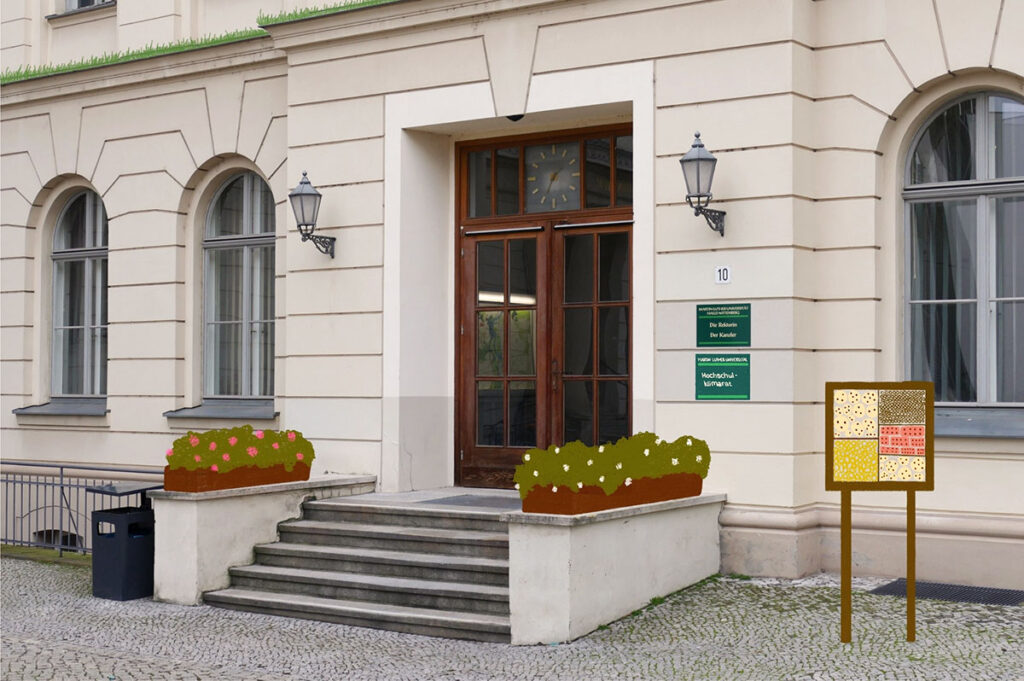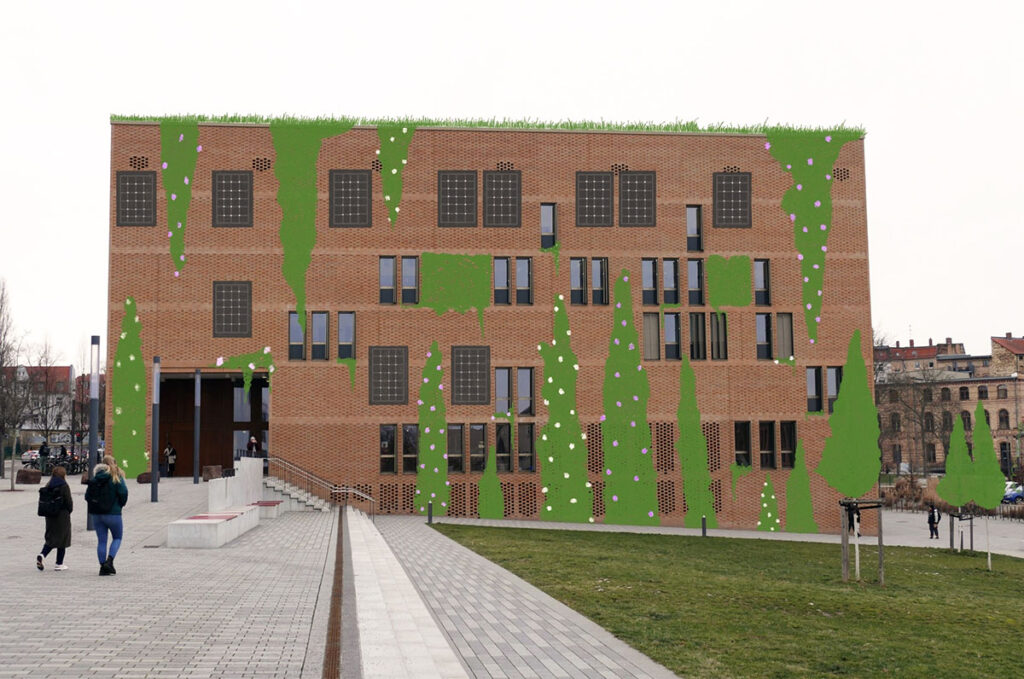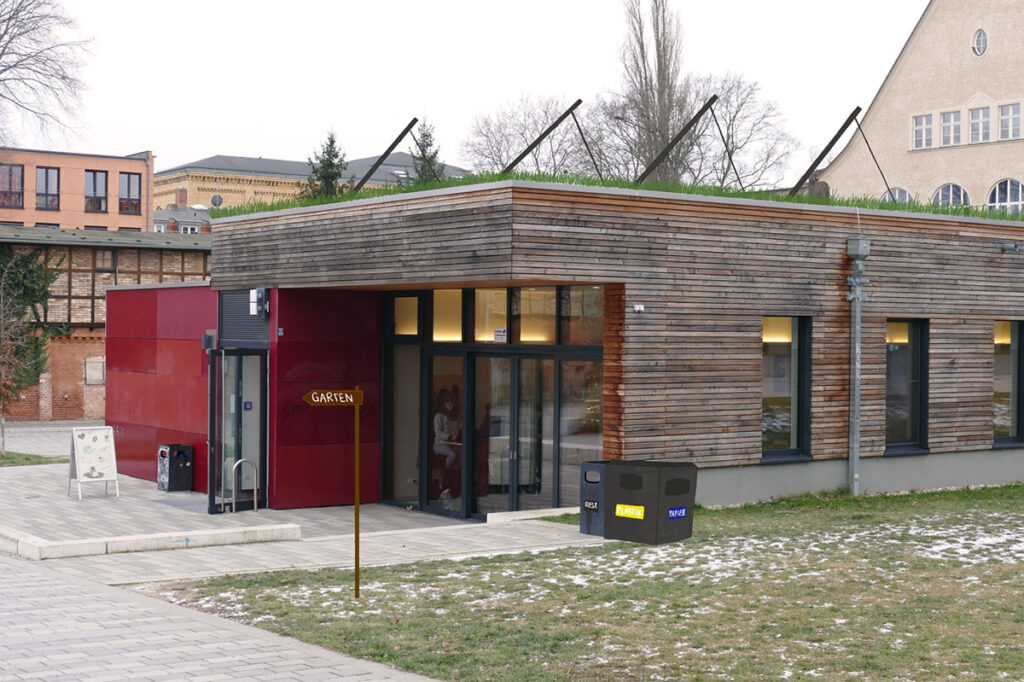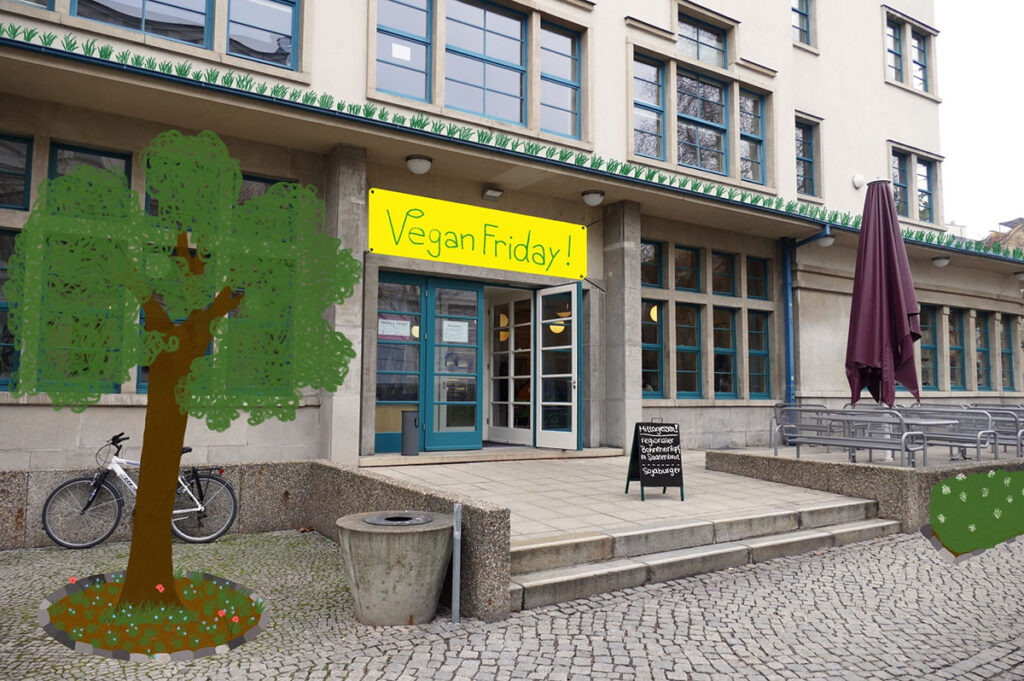On 20 November 2023, the University Climate Council submitted a blueprint to the university administration, proposing a total of 42 measures to improve Halle University’s biodiversity and climate-friendliness. Now what is the climate plan supposed to achieve and will the planned measures even be sufficient?
In the project “Sustainable Transformation Paths to Climate Neutrality with Planning Cells and Real-World Labs” (in short, KlimaPlanReal) Otto-von-Guericke-Universität Magdeburg, Hochschule Magdeburg-Stendal, Hochschule Anhalt, Hochschule Harz, and Martin-Luther-Universität Halle-Wittenberg cooperate to make future university operations climate-neutral and to discover new ways to better incorporate sustainability issues into research, teaching, and student life.
The project consists of four stages. At first, status quo reports were drawn up, evaluating to what extent sustainability issues have been integrated in university operations so far. MLU’s report refers to data from the year 2021. Subsequently, measures facilitating climate-neutral university operations were to be devised. These proposals are now available as a climate plan developed by the University Climate Council.

According to MLU, this climate plan has been in some respects a reaction to the student activist group “End Fossil — Occupy! Halle”, who had squatted a lecture hall in January 2023. They had demanded a climate-conscious transformation of the university, among other things through a more critical teaching and a more climate-related curriculum, as well as improvements in the areas of energy, mobility, infrastructure, and nutrition. However, the climate plan had been envisaged since late 2022.
In the next step, the university’s project team will select some of the developed proposals and test them in so-called transfer laboratories. Finally, the project’s findings are to be documented in a way that other higher education institutions can follow this guide to a more climate-friendly university reorganization.
What Exactly Is the University Climate Council?
Martin Luther University’s Climate Council convened on two days in the summer of 2023. It was composed of randomly selected student applicants, as well as professors, academic staff and supporting staff. University employees were in the pool by default but could opt out if they were drawn. This selection process was intended to help make the committee diverse and to allow for the involvement of the widest range of perspectives.
The council comprised 30 people from these groups, assisted by experts providing scientific input either locally or by phone. This input served as the basis for the proposals in Halle University’s climate plan.
And What Does the Climate Plan Say?
The University Climate Council investigated three core issues relevant to the university, discussed expert input, and proposed solutions. These matters included sustainability, aspects of a regenerative campus, and sustainable procurement and nutrition.
Besides, as a result of negotiations between the university and “End Fossil: Occupy! Halle” it was stipulated that the topic of climate disaster should be further integrated in the curriculum. “However, suggestions from the University Climate Council to work on topics such as climate crisis in teaching were rejected by the Office for Sustainability, which was the organiser of the council.” says Mario F., a student member of the council.
The meetings of the University Climate Council resulted in a document of almost 50 pages that presents 42 measures to reduce greenhouse gas emissions on campus. Suggestions include drawing up a sustainability report for the whole university on a regular basis from winter semester 2025/26. Furthermore, the plan recommends establishing the University Climate Council as a democratically elected and permanent institution at MLU.

Sustainable Mobility
Within the field of mobility, business trips were identified as the primary category in which emissions could be effectively saved. In this regard a ban on domestic flights has been proposed, or at least to tighten the requirements for exemptions and instead provide financial or time-based incentives to use more sustainable transport such as railway. Local public transport should be improved as well. “For adequate and attractive passenger transport by HAVAG, a variable and sometimes higher frequency with peak supply in the morning and evening as well as longer trams should be used.” Furthermore, cycle paths between campuses should be improved and upgraded, for instance by removing cobblestones. In addition, free bicycle rental for students and trainees should be offered. Bicycle repair stations have also been discussed. Another idea is to develop a mobility app that can determine routes with the lowest CO₂ emissions and evaluate individual mobility anonymously. This would make it possible to consider bonuses for people who cause particularly low emissions, for example by using bicycles or public transport.
Moreover, the University Climate Council discussed changes to the parking policy. While it should not be banned, parking should become less convenient and more expensive. However, it has been specified that this rule should not apply to guardians or people with disabilities. There should also be more park and ride sites.
According to a member of the University Climate Council, the commuting flow between Leipzig and Halle could not be included in the development of measures due to a lack of data. Therefore, they see a need to collect these statistics and to develop measures aimed at reducing individual commuting.
Regenerative Campus
The concept of a regenerative campus not only addresses the goal of sustainability but also implies that the campus design actively contributes to regenerating the environment. This goes beyond just reducing the resource consumption to actually reversing it by becoming a producer of resources.
To implement this concept, the University Climate Council proposed installing photovoltaic arrays, for example on roofs and open spaces. In addition, campus areas should be gradually unsealed and greened up with regional plants promoting biodiversity. For instance, the number of parking spaces can be reduced in favour of planting. “Long term goals include more (native) plants and insects, better water infiltration and thus the preservation of groundwater, as well as reducing the ambient temperature in the city.” Greening of roofs and facades is laid down in the climate plan, too. In another idea, students and staff could create and cultivate communal beds to contribute to a climate-friendly supply in the canteens.
Waste separation is also an important concern for the University Climate Council, which is to be implemented primarily within the university buildings. This is a low-threshold measure that can be put into practice quickly.
Sustainable Procurement and Nutrition
Essentially, the University Climate Council considers a comprehensive digitalisation of the university as a pivotal basis. Moreover, the idea of an exchange and borrowing service for electronic devices within the university met with much approval. In addition, the current equipment should be checked for its carbon footprint and in case of new acquisitions attention should be paid to the most sustainable options possible. Available meals in the canteens and cafeterias offer another great potential for a more sustainable approach. However, the climate plan points out that the Studentenwerk would be in charge for this, not the university. At any rate, a potential measure could be to „individually calculate the climate footprint for each canteen dish (including snacks in the cafés) and to price them accordingly. The more harmful to the climate a dish has been classified, the more expensive it will be; the more sustainable it is, the more affordable it gets.“ Moreover, prices should be kept fair, and a discount offer for apprentices should be made available. Other measures discussed included meat-free days as well as a guaranteed vegan offer in every canteen.

Will this Plan Make MLU Climate-Neutral?
This question can’t be answered yet. While the climate plan offers many ideas to make university operations more sustainable and climate-friendly, there are no numbers or projections on whether implementing these measures would reach climate neutrality, or even positivity. Besides, the University Climate Council’s proposals are mere suggestions without any binding character. It is therefore unclear how many of the presented measures will come to fruition.
Furthermore, the whole project fails to seize the chance to make all of Saxony-Anhalt’s academic landscape more climate friendly. What is missing are for example cooperations with the close-by art school Burg Giebichenstein or Hochschule Merseburg that could have opened the opportunity for a faster and wider implementation of climate-friendly measures at more universities. With the current project structure, it is only after the proposed measures were tried out that the left-out colleges will have access to the results and be able to apply the findings to their own structures. This will slow down improving the climate footprint of Saxony-Anhalt’s universities.

As a member of the University Climate Council, Mario F. considers the climate plan as it has been presented to be ambitious but utopian. „Above all it shows the limits of what individual institutions can achieve and where a society as a whole must change direction. But then they’ll need to provide sufficient resources for the task, too. The way it is here, it looks like yet another alibi project. This is not least reflected in how the sustainability office has been funded and staffed, which had no longer a head by the time the climate plan was handed over because they had failed to extend the position in time.“
In a statement, Students for Future Halle have criticised the situation in the sustainability office, too: „Without human expertise the goals are hard to coordinate and to implement. So far, the Rector’s Office has not been willing to respond to our demands. Originally we had called for five positions in the office.“ Moreover, they view the lack of available data negatively as this meant that important measures — such as concerning business flight trips — could not be developed.
„So, all in all the uni is certainly not going to become climate-neutral by 2030, which has been a unanimous decision by the Senate. It takes a lot more for that. Of course, neither the climate plan nor the Rector’s Office are solely responsible. But they do not live up to their big share of responsibility either. At the end of the day, they all point fingers at others and use this as an implicit excuse for their own inadequate actions“, says a spokesman of the group.
| Further Reading: https://www.klimaplanreal.ovgu.de/en/ |
Text and photos/montage: Henriette Schwabe
Translation: Konrad Dieterich
